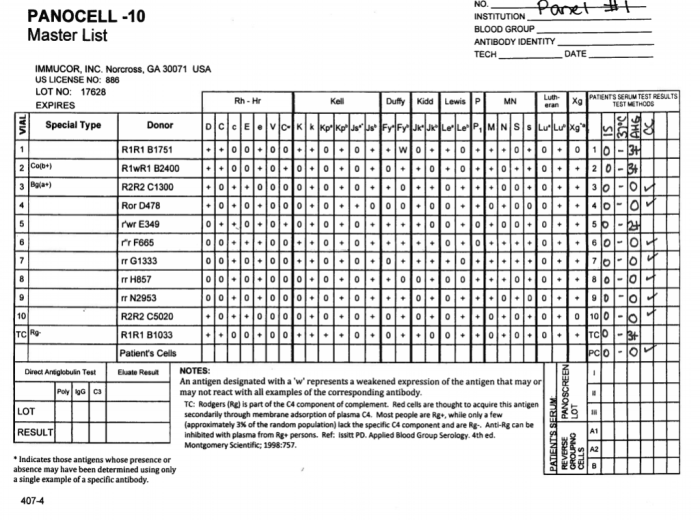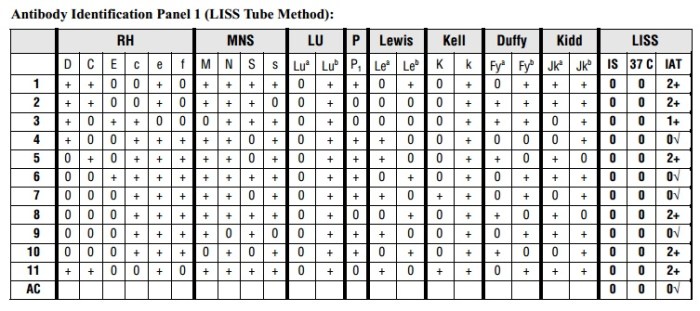Antibody Panel Practice with Answers provides a comprehensive overview of antibody panels, their interpretation, applications, techniques, reporting, and future directions. This guide is an invaluable resource for healthcare professionals seeking to enhance their understanding and proficiency in antibody panel practice.
Antibody panels are essential tools in clinical practice, aiding in the diagnosis, monitoring, and management of various diseases. They offer a comprehensive analysis of an individual’s immune response, providing valuable insights into their health status.
Antibody Panel Practice

Antibody panels are essential tools in clinical practice, providing valuable insights into a patient’s immune status and aiding in the diagnosis, monitoring, and management of various diseases.
Antibody Panel Interpretation
Interpreting antibody panel results involves a systematic approach, considering the patient’s clinical presentation, underlying conditions, and the specific antibodies detected. A step-by-step guide can help ensure accurate interpretation and minimize common pitfalls.
Pitfalls in Antibody Panel Interpretation
- Overinterpretation of positive results
- Underinterpretation of negative results
- Ignoring clinical context
- Misinterpretation of equivocal results
Antibody Panel Applications

Antibody panels have a wide range of clinical applications, including:
- Diagnosis of autoimmune diseases (e.g., rheumatoid arthritis, lupus)
- Monitoring disease activity (e.g., in inflammatory bowel disease)
- Evaluating response to therapy (e.g., in cancer)
- Screening for infectious diseases (e.g., HIV, hepatitis)
Antibody Panel Techniques
Various techniques are employed in antibody panel testing, each with its advantages and disadvantages:
Enzyme-linked Immunosorbent Assay (ELISA)
- Advantages: High sensitivity, quantitative results
- Disadvantages: Time-consuming, labor-intensive
Chemiluminescent Immunoassay (CLIA)
- Advantages: Rapid, automated
- Disadvantages: Lower sensitivity than ELISA
Immunofluorescence Assay (IFA)
- Advantages: Visual interpretation, allows for cell-based analysis
- Disadvantages: Subjective interpretation, lower throughput
Antibody Panel Reporting
Accurate and timely reporting of antibody panel results is crucial for optimal patient care:
Sample Antibody Panel Report
| Antibody | Result | Interpretation |
|---|---|---|
| Anti-nuclear antibody | Positive | Suggestive of autoimmune disease |
| Anti-neutrophil cytoplasmic antibody | Negative | Not suggestive of vasculitis |
Ethical Considerations, Antibody panel practice with answers
- Confidentiality of patient information
- Appropriate use and interpretation of results
- Communication of results to patients and healthcare providers
Antibody Panel Future Directions

Advancements in antibody panel testing include:
- Multiplex assays for simultaneous detection of multiple antibodies
- Point-of-care testing for rapid results
- Personalized medicine applications based on antibody profiles
Common Queries: Antibody Panel Practice With Answers
What are the advantages of using antibody panels?
Antibody panels offer several advantages, including providing a comprehensive immune profile, aiding in differential diagnosis, monitoring disease activity, and guiding treatment decisions.
What are the common pitfalls in interpreting antibody panel results?
Common pitfalls include misinterpreting non-specific binding, failing to consider clinical context, and overlooking the limitations of the test.
What are the future directions in antibody panel practice?
Future directions include the development of multiplex assays, automation of testing procedures, and the integration of artificial intelligence for data analysis.